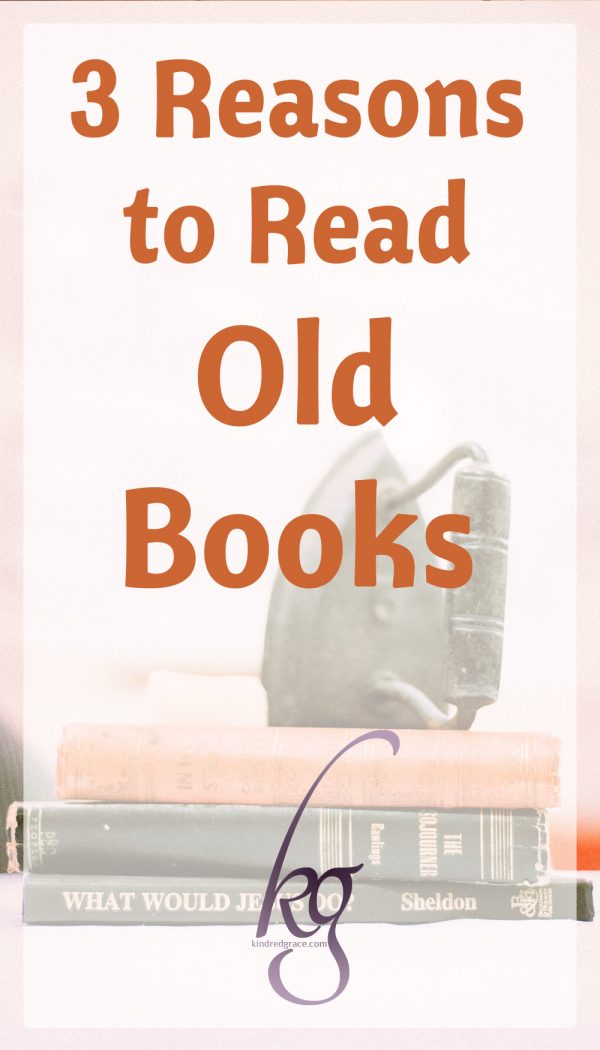3 Reasons to Read Old Books
Have you ever taken one of those online quizzes that will supposedly prove how educated or well-read you are based on how many books on their list you’ve read?
Often we want to be able to check off those classic titles simply to be able to say we read them, to have them on our reading resume, proving we are sophisticated readers or educated individuals.
But the real reason to read classics is not so that we can prove something about ourselves or so we accumulate “good reader points” on online quizzes. The real reason we should read classics is because they open our minds to experiencing life from a different perspective.
There are three ways that classic literature does this better than a modern best-seller, although any novel written by a perceptive author does help us see life through a new lens. Still, it is the classics that do it best.
1. Classics help us understand people better.
While many popular novels are bestselling because they provide easy entertainment, classics are classics because they have proven over time that they speak beyond our immediate circumstances and current fads and truly address the human condition. Humans are still humans, even after thousands of years, and the classics are those books that communicate timeless truths and themes about human beings.
By reading these stories, we learn more about how others think, react, and choose. We learn about personality types when we recognize people we have encountered in characters we read about. We learn that people are individual and quirky and unexpected, as well — classics don’t become classic if they are full of stereotypes.
We also see ourselves in characters we read about, and begin to grasp how our decisions and mindsets and character might get us into trouble. We also see potential in ourselves when we think how we might be like this or that hero or heroine and are inspired to choose well and to love well.
Reading perceptively written stories teaches us how all people are alike, regardless of the age they live in. These stories help us meet new people with open minds and interpret the actions of those around us with more charity, as we begin to understand how motivations impel people towards choices both good and bad.
2. Classics show us how relationships thrive and fail.
Rare is the classic about one solitary individual. Most stories focus on a network of people, either large or small: a community, whether a family, a town, a band of troops, or any other set of people thrown together to encounter difficulties side by side. Most stories can be seen through this framework: put together two or more people unlike each other; give them a reason to quarrel; see what happens.
If we read story after story, seeing that thread over and over, then we can also begin to look at our own lives and see that perhaps our personal stories are not about how everything is against us, but about what happens when we respond to challenges and challenging people.
We learn a lot about consequences of choices made through classic stories. The protagonist generally makes decision after decision that propels him onward, and his choices affect not only himself, but those around him. By reading a classic story, we see how devastating bad choices can be and we see how the the right choice sometimes seems to turn out badly in the short-term, but over the long haul, the right choice is shown for what it is and honored.
3. Classics shake us out of our modern assumptions.
Different generations have different perspectives, different biases, different ways of talking about the world. When we dip back into books written in previous generations, we are able to gain a fresh perspective and consider angles we aren’t accustomed to seeing.
C.S. Lewis wrote:
“Every age has its own outlook. It is especially good at seeing certain truths and especially liable to make certain mistakes. We all, therefore, need the books that will correct the characteristic mistakes of our own period. And that means the old books.”
(“On the Reading of Old Books” in God in the Dock)
Reading books from our own time as well as different periods of the past helps us broaden our perspective and open our minds to thinking about people and society in different categories, different lights. As we notice assumptions they make that might be quite contrary to our own, it throws our own assumptions to light and we can think about them the better for having something to compare them with.
Five Classics to Whet Your Appetite
Of course, the ancient stories of Homer and the detailed stories of Dante and humorous but complex stories of Charles Dickens are all excellent classics to read, but you don’t have to start there. Some of the best classics are generally counted as children’s literature, because people have always crafted stories to train the minds and hearts of their young.
I must quote C.S. Lewis once again:
“No book is really worth reading at the age of ten which is not equally – and often far more – worth reading at the age of fifty and beyond.”
(On Stories: And Other Essays on Literature)
Never look down on a classic for having a J in its call letter at the library. Even if your reading of classics only happens during read aloud time with kids, it’s still mind-strengthening reading.
These five classics are ones you can share with children or enjoy on your own, still making us think, taking us out of ourselves, and helping us experience again the wonder of the world. Audio books can be a great way to experience classics that you have a hard time reading — someone with the right accent and an understanding of how to communicate the text can make a world of difference in not only comprehension, but also enjoyment of the story.
- The Hobbit by J.R.R. Tolkien: An adventure tale that teaches not only about what dragons are like, but also how average, boring, bungling people can turn out to be the true heroes.
- Heidi by Joanna Spyri: This story beautifully illuminates faith and trust as it plays out in the life of a child and those she encounters. Make sure your edition is unabridged, because it is usually the Christian themes that are edited out to abridge the story.
- Wind in the Willows by Kenneth Grahame: Sometimes exaggerated characters provide us the most clarity; most of us will see ourselves — perhaps in rather uncomfortable ways — as this humorous animal story plays out.
- Adventures of Huckleberry Finn by Mark Twain: Twain is brilliant at capturing the mind of clever adolescent boys, and this rollicking fun story is all about everyday interactions and interpersonal communication.
- Any Shakespeare Play: Yes, Shakespeare is for kids as well as adults. Shakespeare is the ultimate English writer; in many ways he made English respectable and beautiful. Shakespeare wrote what would have been the popular movies of his day; he doesn’t have to be intimidating or confusing. I have a series on my blog called Shakespeare for Kids that explains how to begin Shakespeare reading (and watching!) in such a way that builds a love of the stories and language.
Classics prepare us for engaging well with ourselves and with others by giving us categories for and examples of complex people, complex situations, and complex motivations. The more we can take those stories, turn around, and see our own life as a story playing out – especially if we can see ourselves as a player in other peoples’ stories and how our words and choices are affecting their plot line – the better off we will be.

Photo Credit: JenniMarie Photography



Thanks! I have always been a classic reader, and not many people understand that. They are often the thing I resort to when I can’t see anything worthwhile at the bookstore. You can usually find great used books at thrift stores. There are also a great selection of newer books popping up once in a while[for me, a great modern book tells a story from 100 years ago!] Great post!
I still remember when I read Heidi through for the first time– it was a classic I never read because I saw the movie when I was little and then assumed I knew the story. But oh! how amazing the book was!
Thank you for the encouragement to pull a few more classics down from the bookshelf and read or reread them.
Mystie,
Thanks for sharing! I love this post because…I love old books! But as a slow reader, many classics on my shelf are still unread. This has encouraged me to pull them down more often. I am especially interested in reading Heidi now!
Thanks again!
Everly
I loved this post. (I knew there was a reason I loved old books!) Thank you so much for sharing with us, Mystie.
And that first quote from C.S. Lewis? Absolutely perfect. (And it was a quote we’d never heard before!)
Great article, Mystie! You explained the classics so well. I admit I haven’t read very many in my childhood. I have been reading more in my adulthood and when I homeschooled. I still have so many I want to read. Great information here! Thank you.
Good thoughts concerning the perspectives of different generations.